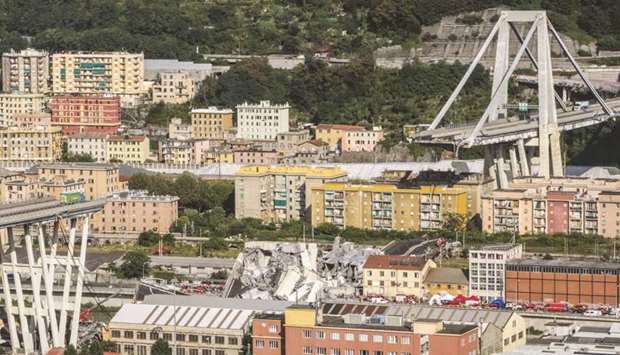In Europe, hardly anyone has a good word to say about Italy’s upstart ruling coalition, which comprises the populist Five Star Movement (M5S) and the nationalist League party. The only disagreement is between those who want to penalise Italy immediately for defying eurozone budget rules and those who are willing to delay punishment, or at least administer it more slowly. But here’s an idea: Why not eschew punishment altogether and give Italy’s government a chance?
The reason is not that the coalition is particularly likeable. It isn’t. M5S goes out of its way to insult and threaten critical journalists, and the League disparages immigrants and badgers local governments that show hospitality toward asylum seekers who have risked their lives crossing the Mediterranean.
Still, there are good reasons to reserve judgment on the government. After all, it is still very new, is domestically popular, is in a position actually to do some good, and is challenging fiscal rules that needed to be reformed anyway.
Yes, the M5S/League coalition is noisy and rebarbative. Under the de facto leadership of the League’s Matteo Salvini, the interior minister, it has a knack for annoying domestic and foreign critics alike on a daily basis. But while it already feels as if Italy’s populists have been around forever, it is worth remembering that their government is barely six months old.
No government should be judged so quickly unless its actions (not just its words) are so reckless as to endanger the country’s constitution, security, or stability. The M5S/League coalition has not yet done that. What it has done is propose an annual budget that entails a deficit of 2.4% of GDP in 2019 – around three times larger than the deficit proposed by the previous government, but hardly huge by international standards.
As expected, the budget proposal drew fire from the European Commission, which could open its first-ever “excessive deficit procedure” against a member state. But the government is chiefly proposing increased public spending and tax-cut handouts designed to deliver on its members’ campaign promises. Such measures may prove wasteful or ineffective, but they do not rise to the level of being reckless.
Moreover, unlike many new governments, the M5S/League coalition’s popularity has grown since it came to power. Together, the two parties have more than 60% support among Italian voters. That may not last, but nor can it be ignored.
And while some of the coalition’s popularity is due to support for unattractive policy positions – namely, the ruling parties’ anti-immigrant stance and confrontation with the EU – it also reflects voters’ desire for a modernised welfare state. A charitable interpretation of the coalition’s intent is that it is pursuing a system modelled on the successful “flexicurity” measures pioneered by Denmark. (And, of course, tax cuts and pension hikes never go down badly with voters.)
To be sure, the “citizenship income” proposed by M5S will be devilishly hard to implement. The idea is to furnish a monthly payment of €780 ($888) to those who are actively looking for a job, and to register and guide recipients through local job centres (as in the Danish model). The problem is that Italy’s local public administration is notoriously ineffective, especially in the south, where unemployment is highest.
And yet, even if there is good reason to be sceptical about the plan, it is nonetheless a step in the right direction. It may take a decade to test its feasibility and optimise its implementation. But it is about time that an Italian government at least started the process.
The government’s budget as a whole should be viewed in the same spirit. Independent economists are surely right that it will not deliver the growth boost that the coalition has promised. Though the budget would provide a broad sprinkling of cash, it does not amount to a well-focused stimulus effort.
But, rather than risk a full-scale crisis by blocking Italy’s 2019 budget, the European Commission would do better to push for more focused structural reforms in 2020, after the coalition parties have met their campaign promises. Whereas higher interest rates on Italian government debt and a confrontation with the EU could lead to recession and even disaster – if it prompts threats of an “Italexit” from the euro – a more accommodating approach could forestall the worst.
Among Italy’s main economic weaknesses are its historically low levels of public investment and its creaking infrastructure, as evidenced by the tragic collapse of the Morandi Bridge in Genoa this August. Unfortunately, the coalition is currently divided over infrastructure spending. While the League has been pressing for more high-speed trains and new roads, some in M5S remain in thrall to an anti-capitalist, anti-development ideology. This impasse needs to be broken, either within the coalition or through a new general election in 2019 if necessary.
In the meantime, the remaining 18 eurozone member states should consider whether the 2012 “fiscal compact” that they forged in the thick of the euro sovereign-debt crisis needs to be updated. Mario Monti, Italy’s prime minister at the time, has long pressed for capital investment to be treated differently than current expenditure, so that countries like Italy can still pursue desperately needed infrastructure spending.
Monti’s advice should be followed. And while eurozone governments are debating the issue, they would do well to cut Italy’s government some slack. Another former Italian prime minister, Romano Prodi, once dubbed the EU’s Stability and Growth Pact “stupid.” To force a confrontation with the eurozone’s most populist – and popular – government in the name of outdated, overly rigid rules would be stupid indeed. – Project Syndicate
l Bill Emmott, a former editor-in-chief of The Economist, is the author of The Fate of the West.

Among Italy’s main economic weaknesses are its historically low levels of public investment and its creaking infrastructure, as evidenced by the tragic collapse of the Morandi Bridge in Genoa in August 2018.
